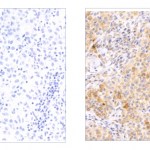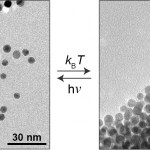personalized medicine
Metastatic melanoma tumors. Left exhibits low or absent expression of RASA2 and reduced survival, typical of about 35% of patients. The sample on the right exhibits high RASA2 expression and increased survival
Rates of melanoma are increasing, even as the rates of other common cancers are decreasing. According to the Melanoma Research Alliance, it is the most common cancer diagnosis in young adults 25-29 years old in the United States, the second most common cancer in young people 15-29, and its incidence has tripled in the last 30 years.
What are we doing about it? The Weizmann Institute’…
One day in the future, we may be treating our ailments with microbiotic combinations designed specifically to correct imbalances in our personal microbiomes. We’ll bring our prescriptions on rewritable paper and pay using shimmery optical chips embedded in our cell phone cases or maybe our jewelry. Or we’ll be waiting in our doctor’s office for a simple test of our microbiogenome to see if a light-based nanoparticle delivery treatment is working, while watching iridescent optical displays that change as we move...
These future scenarios (and many more) are all imaginary, but…
When Dr. Jakub Abramson was a 14-year-old boy in the former Czechoslovakia, he asked his father what was the best place to do science. His father took the question seriously and, after some consideration, answered “the Weizmann Institute of
Dr. Jakub Abramson
Science.” Since that day, says Abramson, he knew he was bound for the Institute. “It’s just that the science I was interested in back then involved blowing things up,” he says.
Today, Abramson is more interested in exploding the common wisdom about autoimmune diseases. His lab at the Weizmann Institute has produced two new papers –…
The ‘Nifty Fifty (times 4)’, a program of Science Spark, presented by InfoComm International, are a group of 200 noted science and engineering professionals who will fan out across the Washington, D.C. area in the 2014-2015 school year to speak about their work and careers at various middle and high schools.
Meet Nifty Fifty Speaker Dr. Alberto Gutierrez
Welcome to the age of Personalized Medicine -- an emerging era of medical science which involves the development of drugs and other treatments that are tailored specifically to an individual patient, or a group, with…
I've discussed the evolution of "integrative" medicine on many occasions. To make the long story discussed over many posts short, medicine based on prescientific and/or unscientific ideas was once, appropriately, referred to as quackery, and those practicing it, appropriately, as quacks or charlatans—or other derogatory terms. Then, beginning sometime around the 1960s and 1970s, such quackery became known as "alternative" medicine. This was a less derogatory term than what used to be used, but still unsavory. As I put it, alternative medicine was (and is) medicine that does not fit into the…
I've written a lot about a doctor named Stanislaw Burzynski who claims to have much better outcomes in treating deadly brainstem tumors than conventional oncology does. Although the way he claims to do it is through the use of substances he calls "antineoplastons," which he claimed to have isolate from the urine of patients. Over 35 years after having formed his own clinic and "research institute" to use these compounds to treat cancer and after having had over 60 phase I and phase II clinical trials registered with ClinicalTrials.gov, with none of these completed trials having been published…
It's known as "targeted" therapy, and it's the holy grail of cancer research these days. If you listen to its most vocal proponents, it's the path towards "personalized medicine" that improves survival with much lower toxicity, in which, instead of using the hammer that is chemotherapy, precisely targets specific molecular abnormalities that drive cancer growth. With the advent of the revolution in genomics that has transformed cancer research over the last decade, including the petabytes of sequence and gene expression data that pour out of universities and research institutes, the promise…
A common theme I hear in talks on personalized medicine, is that increased access to genomic data and medical literature are changing the relationship between doctors and patients. Patients are through being passive recipients of paternalistic health care. They are demanding to participate and be treated as partners with health care providers.
Citizen science can serve a similar role.
Just as personalized medicine is starting to make it possible for individuals to monitor and participate in their own personal health, citizen science is making it possible for people to participate and…
The New York Times had a great article a couple of days ago on the need for personalized medicine to become more than a catchy phrase.
As we're learning more about the interaction between genes and drug metabolism, we're also learning that large numbers of people are either taking the wrong drug or taking drugs that won't work.
tags: personal genomics,
pharmacogenomics
Researchers have known for some time that genetic variants determine how well drugs work. Some versions of a gene cause a drug to be metabolized faster, some slower, and when combined, at an intermediate rate. In the…



